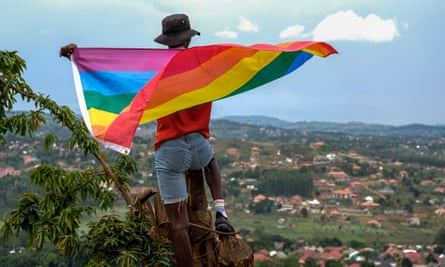The visa application of Sarah Achieng Opendi, a member of parliament from Uganda, has been rejected for the upcoming United Nations gathering in New York after her controversial remark in a parliamentary discussion advocating for the castration of homosexuals, in a country with some of the strictest laws against the LGBTQ+ community.
Opendi was surprised when the US embassy in Kampala denied her request to attend the 68th session of the Commission on the Status of Women. The embassy stated that her application was under “administrative” review.
Opendi, the chairperson of the Uganda Women Parliamentary Association, stated that 96% of MPs voted in favor of the bill. Furthermore, she acknowledged that while several MPs who supported the bill have received US visas, there are others who have not.
According to a spokesperson from the US state department, they are unable to comment on specific visa cases.
During the month of December, the United States implemented limitations on travel visas for numerous Ugandan legislators and their loved ones due to their participation in enacting a law, approved by President Yoweri Museveni, that enforces capital punishment or life imprisonment for specific same-sex behavior, as well as sentences of up to 20 years for “soliciting, encouraging, and financing” same-sex “behavior”.
Anita Among, Speaker of Parliament, was denied a visa by both the US and UK last year. This move has been met with approval from activists in Uganda.
According to human rights lawyer Nicholas Opiyo, during the discussion of the strict law against homosexuality, several Ugandan lawmakers expressed that they are uninterested in the concerns of their development partners because they do not plan on traveling to their jurisdictions. Opiyo referred to this as a situation of consequences finally catching up with the lawmakers.

Display the image in full screen mode.
He said that denying a visa is a powerful statement against those who promote hatred. He hopes it clearly conveys that such people have no place in civilized societies.
According to Kampala human rights advocate Steven Kabuye, politicians are facing consequences for their actions.
He stated that it is hypocritical for them to disapprove of homosexuality in their own countries and then seek out a better life in LGBTQ+ friendly environments. He expressed pleasure that the US is enforcing a visa ban on Ugandan politicians who disrespect human rights.
Many African countries, specifically 33 out of 55, have laws prohibiting same-sex relationships. These laws were mostly established during colonial times.
Kenya, Namibia, Niger, Tanzania and Uganda have moved to tighten anti-gay laws. Last week Ghana passed a bill criminalising same-sex relationships. Namibia has recently legislated against same-sex marriages and Kenya has a bill before parliament seeking to outlaw same-sex unions.
On Monday, the International Aids Society expressed concern that a surge in anti-gay laws threatens the HIV response.
The president of the IAS, Sharon Lewin, emphasized the importance of cooperation between government and vulnerable communities in addressing the pressing issue of HIV.
We are asking the presidents of Ghana, Namibia, and Kenya to take a stand against these bills that promote discrimination. We at the IAS urge you to prioritize people and follow the evidence-based approach, as criminalizing any group of people only worsens the HIV pandemic by preventing them from accessing testing, treatment, and care.
There is currently a pending decision on a constitutional court case that involves the Ugandan law, as civil society organizations are interested in the outcome.
Source: theguardian.com


















